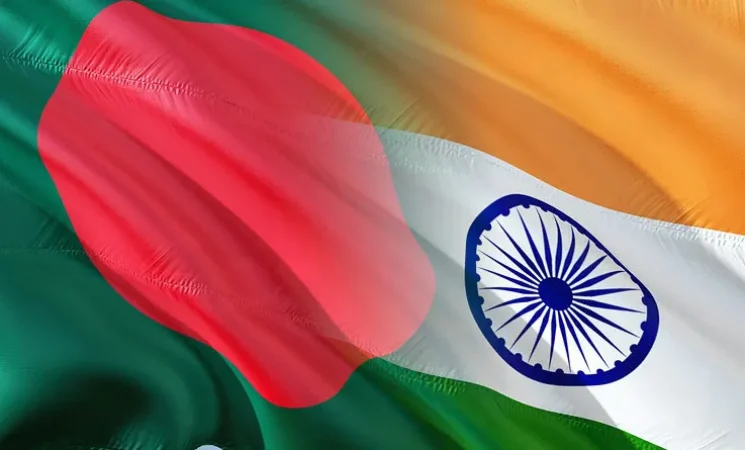22 August 2022, NIICE Commentary 8204
Md. Shariful Islam
Bangladesh Prime Minister Sheikh Hasina is set to visit to India on September 5 for a four-day official visit. On the occasion of this visit, this article focuses on how and why Bangladesh matters to India and investigates how media, epistemic community, think tanks Bangladesh-India relations.
Kanti Bajpai, a prominent International Relations scholar wrote at the Times of India on 17 September 2011 on the importance of Bangladesh to India’s well-being. In his article, Bajpai argued that “We in India have failed to appreciate just how important Bangladesh is to our well-being”. Bajpai identified four reasons, which make Bangladesh important, related with India’s security, trade and development. Bajpai concluded that “Bangladesh matters if only we could see”.
Joyeeta Bhattacharjee, another scholar on India-Bangladesh relations and India’s neighbourhood policy, in her article, “Transformation of India-Bangladesh Relations and the Challenges Ahead” argued that “Bangladesh is an important country in India’s neighbourhood.” She further noted that “for a long time,....the relationship was mired with a feeling of mistrust and suspicion. A transformation in the bilateral relationship was witnessed after the Awami League formed a government in 2009. The friendship between the two countries increased substantially.” In her work, Joyeeta reiterated that “India considers Bangladesh as a major partner in the neighbourhood”.
In her work, Joyeeta concluded that “India and Bangladesh, the leading economies in South Asia, could be a role model for a neighbourly relationship, and this can be achieved with the efforts of two countries by strengthening cooperation”.
Parul Chandra, a senior journalist writes in Deccan Herald wrote that ‘After all, under Sheikh Hasina’s leadership, the Bangladesh government has been one of India’s few steadfast friends in the neighbourhood’ (Chandra, 2021).
Shoaib Daniyal (2021) reported at Scroll.in that “Since Hasina’s election as prime minister in 2009, India-Bangladesh relations have been on an upswing. Hasina has cracked down on North East militant groups such as the United Liberation Front of Asom. Due significantly to Bangladesh’s help, militancy has almost dropped to zero in the North East”.
Another scholar Harsh V Pant and Aditya Gowdara Shivamurthy (December 20, 2021) defined India-Bangladesh relations as ‘a model for the neighbourhood’ and thus argued that ‘The relationship has its roots in history, but both States have ensured continuous engagement, crucial for contemporary South Asian relations’.
Shishir Gupta (26 March2021), a journalist of the Hindustan Times, in his analysis noted that: “While Bangladesh is the key to connectivity to north-eastern India, it also fits into the calculus of trans- Asian highways that will link India to Vietnam by road and could become an economic engine for growth in Myanmar, Thailand, Cambodia, Laos and Vietnam. The development and growth of India’s eastern flank will not only contribute to its GDP with tourism holding a vast potential in North-East but also politically stabilise the region with the Bharatiya Janata Party is a major political force on the eastern front”.
The Hindustan Times, in its editorial (26 March 2021) argued that: ‘if there is one neighbour where all of India’s interests converge, it is Bangladesh. The future of India’s Act East policy, stability and development in the Northeast, economic integration in the larger region, climate crisis, cross-border flow of people, and peace and security are contingent on ties with Dhaka. Over the past decade, if there is one success of India’s neighbourhood policy, it is this relationship’. Thus the editorial suggested deepening Delhi’s ties with Dhaka.
SD Muni, a renowned scholar on South Asia and International Relations argued that: “China is emerging as a major factor in the whole of India’s neighbourhood and Bangladesh is no exception. Bangladesh should also not be expected to follow India’s line blindly in relation to China. They have old and beneficial aspects of engagement with China,” (Cited in Janardhanan, 9 March 2018).
Sameer Patil, Director, Centre for International Security at Gateway House, Mumbai, argued that ‘There has not been enough appreciation of India’s stance on the issue because we had to craft a fine balance between our humanitarian, security, and geopolitical priorities’ (Cited in Janardhanan, 9 March 2018).
Thus, from the above perspectives, one can argue that Bangladesh bears strong economic, geo-strategic, geo-political, socio-cultural importance to India. In addition, against the backdrop of Russian-Ukraine war and the Taiwan tensions, Bangladesh and India needs to deepen cooperation on the issues of bilateral, regional and global concern. Consequently, the upcoming visit of Bangladesh Prime Minister Sheikh Hasina to India needs to be utilized to create new horizons of relations of mutual concern.
Md. Shariful Islam is an Assistant Professor at Department of International Relations, University of Rajshahi and Research Fellow at the KRF Center for Bangladesh and Global Affairs, Bangladesh.

